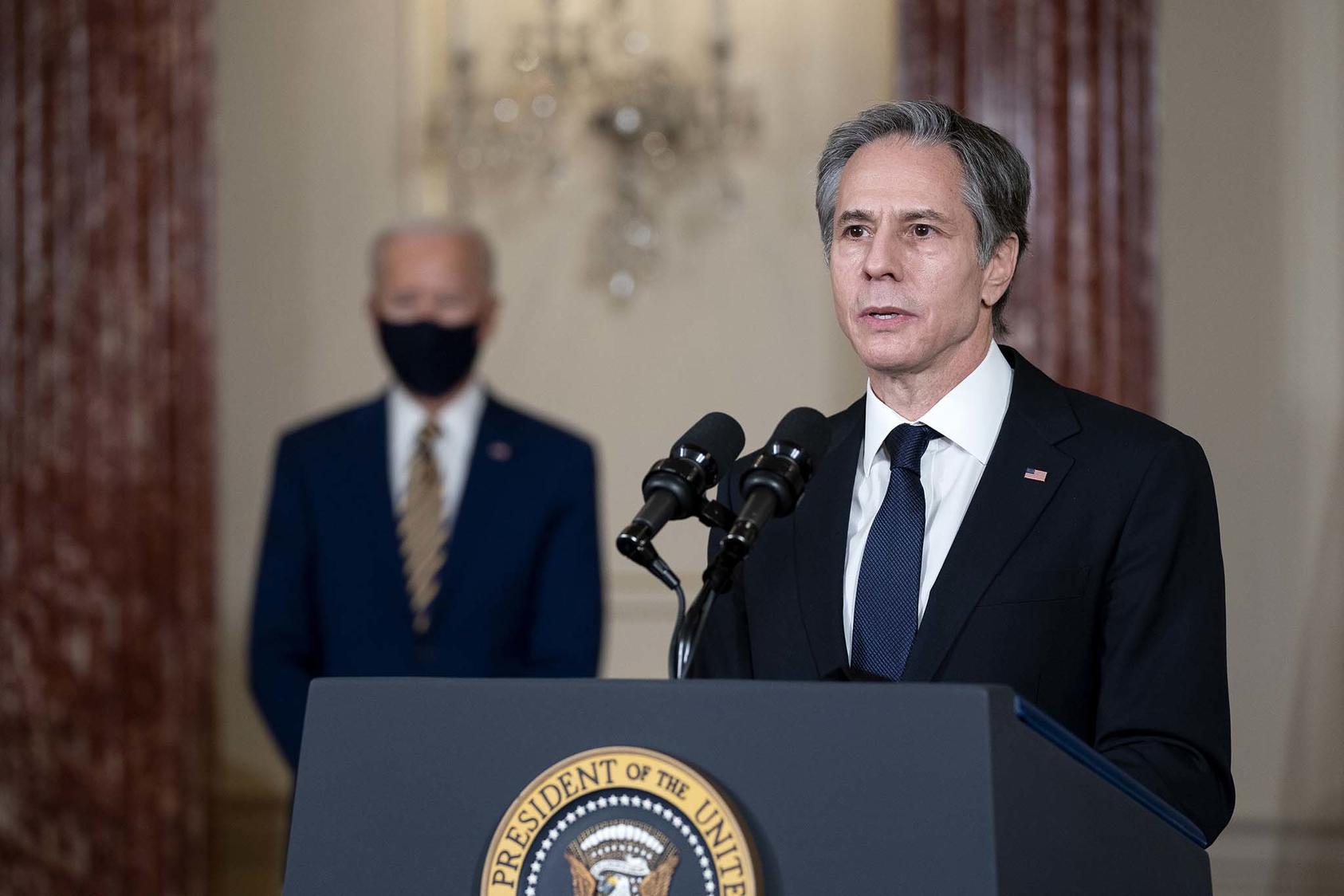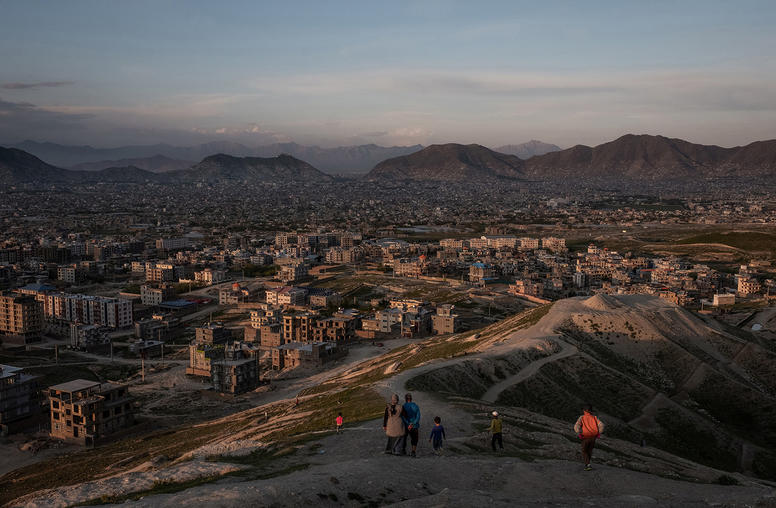Can Blinken’s Letter Jump-start the Afghan Peace Process?
A sweeping proposal from the top U.S. diplomat aims to shift focus from U.S. withdrawal to negotiations.
With intra-Afghan talks gridlocked and the U.S. troop withdrawal deadline looming, Secretary of State Antony Blinken proposed new plans to advance the peace process in a letter to Afghan President Ashraf Ghani. The letter recommends several efforts to “move matters more fundamentally and quickly” toward peace, including a U.N.-convened conference of key regional actors, a senior-level meeting between the Afghan government and the Taliban hosted by Turkey and a 90-day reduction in violence to head off the Taliban’s annual spring offensive. Blinken also recommended an interim power-sharing government composed of Taliban and other Afghan leaders.

The top U.S. diplomat warned that the Biden administration was still considering whether it would withdraw troops by May 1, as stipulated in the U.S.-Taliban deal that paved the way for Afghan peace negotiations. USIP’s Afghanistan experts examine what Blinken’s letter signals about U.S. policy; the response of the Afghan government, Taliban and regional actors; and how the draft proposal addresses Afghans’ concerns over protection of the hard-won gains made in the last two decades.
What does Blinken’s letter signal about U.S. policy toward the peace process and Afghanistan more broadly, especially in regard to the May 1 troop withdrawal deadline?
Smith: On coming into office, the Biden administration was immediately faced with the dilemma that if it withdrew its troops from Afghanistan in May before noticeable progress was made on a political settlement, Afghanistan would likely collapse into civil war (as the Afghanistan Study Group warned). If it kept troops beyond May, the Taliban would likely renew attacks against U.S. and international forces in Afghanistan. In the meantime, the Taliban suspended active participation in negotiations with the Afghan government until it understood the U.S. position, making it more difficult for meaningful progress to be made on the peace process.
The letter is an attempt escape this dilemma by shifting focus from the troop withdrawal to the negotiations. It seeks to do this by putting significant pressure on President Ghani and the Afghan government to act with greater urgency regarding the negotiations. (A similar letter was reportedly sent to the Taliban, but we do not know what that letter stated or what sort of leverage was exerted on the Taliban.) The seriousness of its intent is demonstrated by two elements in the letter. First, mention of a proposed interim framework for a government that would include the Taliban and essentially end the current constitutional regime—and Ghani’s role as president. Second, the ominous statement at the end of the letter that all options were still on the table, including a troop withdrawal by May. This is a letter of exceptionally blunt clarity in diplomatic terms. Surprisingly, it has sowed confusion in Kabul.
How have Afghan leaders responded? What does this mean for Afghan peace negotiations?
Walsh: Key Afghan leaders’ early reactions have varied, but most left themselves a degree of flexibility to either reject or negotiate from the plan as circumstances evolve. The most negative reactions came from Ghani and his team; he initially called the draft “a fantasy,” though his spokesperson later said “consultations will continue—we want to institutionalize a political consensus.” Ghani’s vice president, Amrulleh Saleh, said, “we will make peace with dignity, but never … an imposed peace.” Some leaders of the political opposition were more positive: former Vice President Yunus Qanuni said, “to blindly reject the peace plan is to invite war,” former Foreign Minister Salahuddin Rabbani argued “this opportunity shouldn’t be wasted” and reconciled former insurgent leader Gulbuddin Hekmatyar announced “I am supporting Khalilzad’s [the lead U.S. negotiator] new mission.” Fawzia Koofi, one of four women on the government-led negotiating team, did not explicitly address the draft’s contents but called for caution: “Afghan ownership and Afghan leadership must be respected … the process must not be rushed.” The Taliban have withheld substantive comment, with a spokesman saying only “it is under discussion … after discussion, we will have a position on it.”
Each reaction reflects key Afghan leaders’ longstanding views on establishing an unelected interim government as a bridge to a longer-term peace, one of the draft’s significant and divisive features. Ghani’s oft-stated demand is to preserve Afghanistan’s democratic system, and he has long condemned unelected interim arrangements that would abridge his own term. The loyal opposition would also preserve Afghanistan’s democracy, but is often more open to an interim government that would reduce Ghani’s power. The Taliban may resist the draft’s long-term democracy and human rights provisions, but an interim government would allow them to claim they ended the “illegitimate” system the United States established in 2001. More importantly, the Taliban likely recognize that the United States may prolong its military presence in Afghanistan absent some form of political agreement among Afghans. In short, each group dislikes some of the draft agreement, but none want to be excluded if negotiations on the text begin anyway.
How does the draft proposal address Afghan concerns about ‘protecting the gains’—does it help or hurt preservation of the Republic?
Ahmadi: During his confirmation hearing on January 19, Blinken said, “no outcome is sustainable without protecting the gains made by women and girls in Afghanistan … .” Afghans, particularly Afghan women and girls, viewed his statement as progress and a shift in the U.S. approach to end the Afghan conflict. It was anticipated that the new administration would have a stronger position on protecting Afghan women’s rights amid peace talks in Doha. However, Blinken’s letter to Ghani did not make a single reference to the importance of protecting and preserving women’s rights. The U.S. government’s inconsistency in its messages has led to a lack of confidence among Afghans in the peace process overall and lowered morale during a period marred by increased violence and targeted attacks. The escalating level of violence has already forced a number of prominent Afghan women leaders and activists to flee their country for their own safety and security.
Additionally, the proposal does not address the vulnerability of Afghan women and girls’ rights and of the gains made over the past two decades. The proposed framework omits key institutions such as the Afghan Commission to Eliminate Violence Against Women, among others. Twenty years ago, institutions like this were created to protect and promote women’s rights. Ever since, the United States ensured through financial and human capital that these institutions are effective and sustainable. The United States owes it not only to the Afghan women to continue to support them, but to U.S. taxpayers to remain firm in protecting shared gains for which countless Afghan women have sacrificed. These institutions should be used as building blocks for a sustainable peace in Afghanistan. This is not only the right thing to do, but stipulated by U.S. laws. For example, the Women, Peace and Security Act states: “It shall be the policy of the United States to promote the meaningful participation of women in all aspects of overseas conflict prevention, management, and resolution, and post-conflict relief and recovery efforts, reinforced through diplomatic efforts and programs … .” The Biden administration should bear this in mind as it presses for more substantive commitments from the Taliban in the ongoing negotiations.
Does the call for an international conference with regional actors represent a change in policy, particularly the inclusion of Iran in the proposal? What has been the regional response?
Olson: This approach—which was recommended by the Afghanistan Study Group—represents a shift in policy and certainly a change in practice. Previous administrations have not lodged Afghanistan policy within a regional framework, and there has been no attempt to build a regional “track” to the peace process. Before this initiative there was a U.S.-Taliban track and an intra-Afghan track, but no single regional forum. In the past, the United States has consulted with regional powers—including Iran, both bilaterally and multilaterally—but not in a structured, public forum. That the United Nations would be the convener is essential to getting Iranian cooperation.
The regional response to the initiative has been muted, not surprisingly since it emerged in a leaked document rather than a formal announcement. The most visible reaction has been Moscow’s announcement that it intends to hold its own regional conference, including many of the same countries, but without India. While this may be interpreted as an attempt to compete with Washington, in the short term it is better to have too many regional discussions rather than too few. Since Russia, as a permanent member of the Security Council, would have to acquiesce in any U.N.-sponsored track, a sensible diplomatic approach would be to participate in the Russian initiative and build on it in any future U.N.-convened track.




